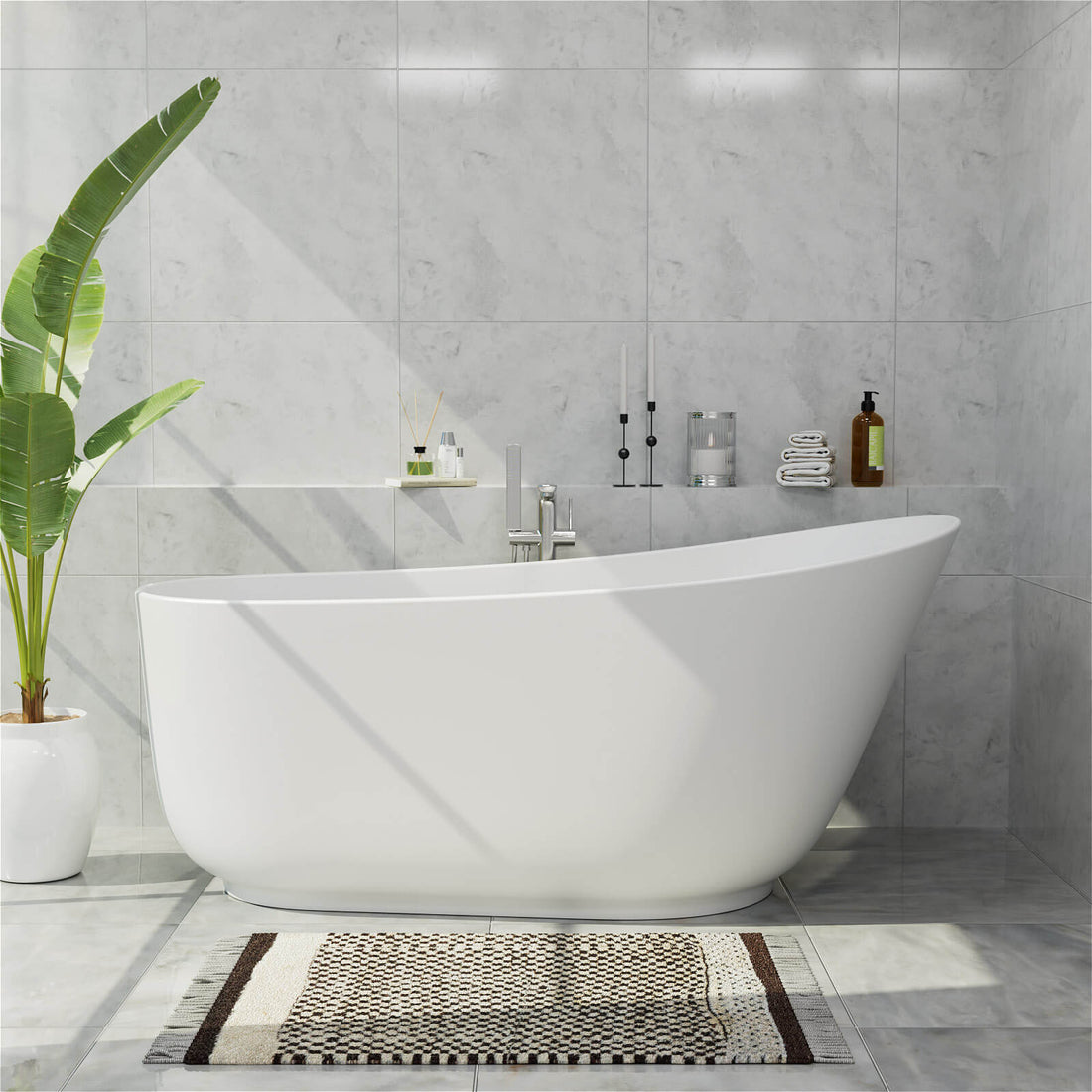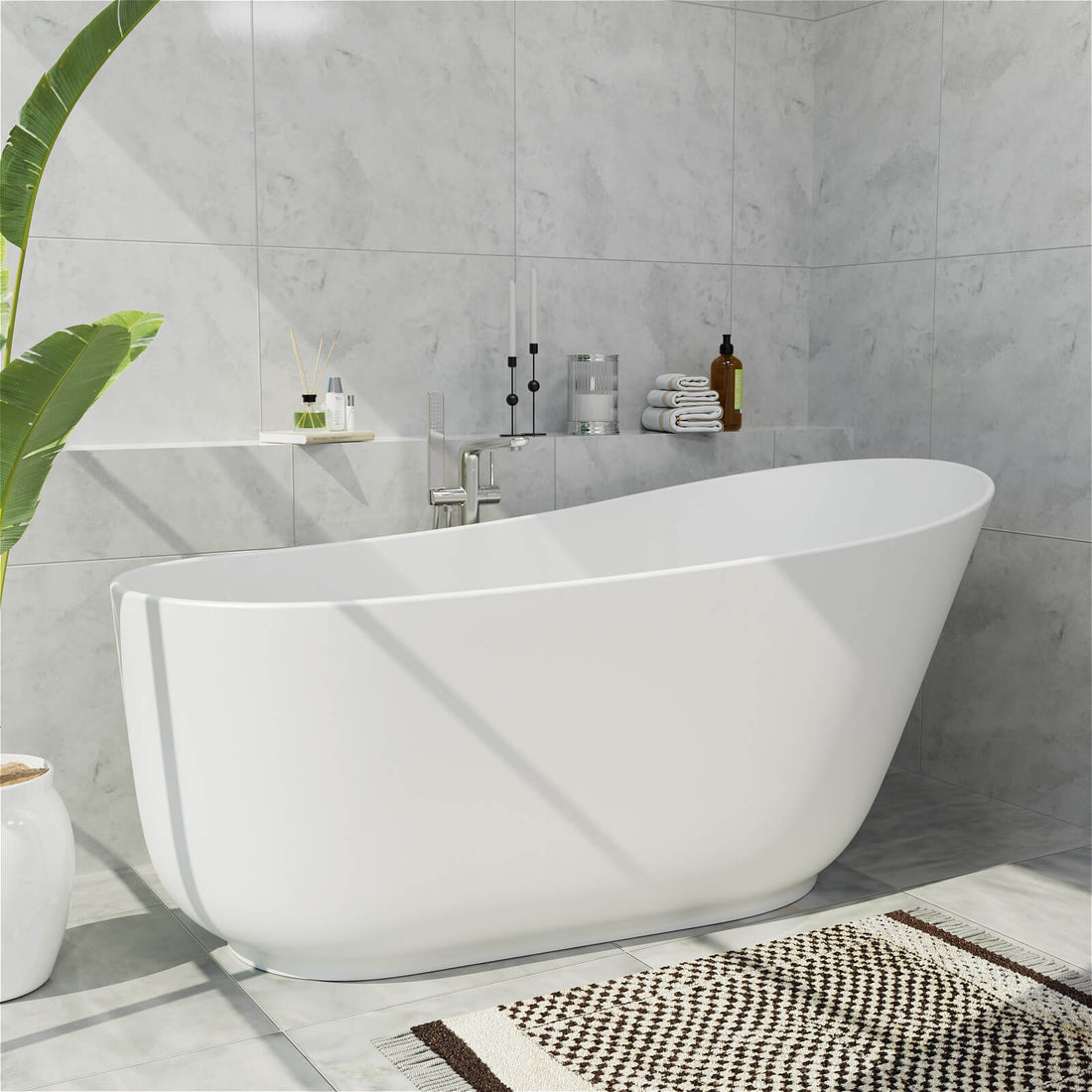Some homeowners may notice discussions comparing solid surface bathtubs to other materials while browsing bathtub online stores for their bathroom remodels. Although solid surface materials are commonly associated with kitchen countertops, they also offer unique appeal and advantages in bathtub design. If you’re drawn to this innovative design, keep reading as we offer a comprehensive introduction to solid surface bathtubs to help you decide if this is the right choice for you. Let’s get started!
Understanding Solid Surface Materials

Solid surface materials, also known as stone resin, are a type of synthetic composite material made from natural minerals, wood, metal, and polymers. They typically come in block, sheet, or other forms, offering a variety of attractive and practical surface options, making them a popular choice in construction and interior design.

While solid surface materials are commonly used for kitchen countertops, their high-end appearance and superior performance have led many manufacturers, including Giving Tree Home, to apply them in bathtub casting. When making solid surface bathtubs, an injection molding process is usually employed, where the molten material is poured into pre-designed molds. Once the material cools and solidifies, the mold is removed and the surface is polished, ensuring the final product is smooth and aesthetically pleasing.
Advantages and Do I Need It
-
Advantages:
- Typically, solid surface bathtubs last at least 15 years.
- Their matte finish offers high-end quality in both touch and appearance.
- Made from eco-friendly materials, they pose no threat to your health or the environment.
- Minor scratches and damage can be easily removed by simple polishing, making maintenance hassle-free.
-
Disadvantages:
- Most solid surface bathtubs feature modern designs, lacking vintage styles.
- Typically weighing around 300 pounds, they are less flexible as standalone tubs.
- Compared to acrylic and fiberglass, solid surface materials are significantly more expensive.
- There are fewer brands offering solid surface bathtubs on the market, limiting selection.
When considering whether a solid surface bathtub is right for your bathroom, it’s important to weigh the pros and cons. For homeowners seeking a modern bathroom design, a solid surface bathtub is an excellent choice. However, if you live in an older home or want to create a vintage-style bathroom, you may want to be cautious. Although some vintage-style solid surface bathtubs exist, the options are relatively limited.
If your budget is under $1000, it’s best not to consider a solid surface bathtub, as it may not even cover the basic purchase costs. Furthermore, due to its weight, you may need to hire help for delivery, which typically costs around $150 for ground floor delivery and $300 for upper floors. Additionally, hallway width can affect delivery fees. Therefore, if you are seriously considering a solid surface bathtub, it’s recommended to budget at least $2000 to cover the entire project cost.
Of course, if you view it as a long-term investment, the cost may seem less important. As mentioned earlier, solid surface bathtubs last at least 15 years, and surface scratches can be restored through polishing, ensuring long-term aesthetic appeal. This means you would only spend about $100 per year for the ultimate soaking experience and beautiful décor.
Solid Surface Bathtub vs. Other Materials

Vs. Acrylic Bathtubs
Acrylic and solid surface bathtubs are the two most common bathtub materials, often compared to each other. Typically, acrylic bathtubs are seen as a cheaper alternative to solid surface bathtubs, costing only 1/2 to 1/3 of the price. They are ideal for budget-conscious customers. Additionally, due to their manufacturing process, acrylic bathtubs contain an insulating hollow layer, providing superior heat retention compared to solid surface bathtubs.
On the other hand, solid surface bathtubs outperform acrylic bathtubs in terms of visual and tactile experience, making them the preferred choice for those seeking a high-end bathroom design. They are not just bathing containers but also stunning pieces of art in your bathroom.

Vs. Stone Bathtubs
Although some homeowners may confuse solid surface bathtubs with stone bathtubs, the two are significantly different. Solid surface bathtubs are made from synthetic materials, while stone bathtubs are crafted from natural stone.
While stone bathtubs provide a luxurious visual effect, making bathrooms look more opulent, they are generally not recommended for home use unless for hotels or resorts. This is because stone bathtubs are expensive and require regular maintenance to prevent issues like moss or mildew, which can pose health risks.
In fact, some believe that solid surface bathtubs were created as an alternative to stone bathtubs for home bathrooms. For those who desire the ultimate stone bathtub experience, solid surface bathtubs with artistic designs can be considered.

Vs. Cast Iron Bathtubs
Cast iron bathtubs are another material often compared to solid surface bathtubs, representing another high-end bathroom option. Cast iron bathtubs typically have a longer lifespan, with some premium brands lasting over 50 years.
Cast iron tubs often come with clawfoot designs, making them ideal for vintage decor or old homes. However, when purchasing a clawfoot cast iron bathtub, it's important to ensure the floor is reinforced to prevent damage. In contrast, solid surface bathtubs have a clear advantage in modern design, seamlessly fitting into almost any contemporary bathroom style.
Best Solid Surface Bathtub Brands

Giving Tree Home
If you're considering purchasing a solid surface bathtub, Giving Tree Home is a brand worth noting. As one of the earliest brands to sell solid surface bathtubs, we differ from other resellers by producing most of our bathtubs directly in our own factory. This means you can trust our products, knowing that Giving Tree Home will meet your expectations in both quality and aesthetics.
Discount Code: GT407— Enjoy 12% off
-
69'' Modern Bathtub Solid Surface Stone Resin Oval-shaped Freestanding Soaking Tub

 69'' Modern Bathtub Solid Surface Stone Resin Oval-shaped Freestanding Soaking Tub
69'' Modern Bathtub Solid Surface Stone Resin Oval-shaped Freestanding Soaking Tub- Regular price
-
From
$1,999.99 - Regular price
-
$2,699.99 - Sale price
-
From
$1,999.99
Quick view
-
63" Stone Resin Double Slipper Tub Center Drain Freestanding Soaking Bathtub

 63" Stone Resin Double Slipper Tub Center Drain Freestanding Soaking Bathtub
63" Stone Resin Double Slipper Tub Center Drain Freestanding Soaking Bathtub- Regular price
-
$1,899.99 - Regular price
-
$2,799.99 - Sale price
-
$1,899.99
Quick view
-
47'' Stone Resin Black Small Freestanding Japanese Soaking Tub with Seat, Reversible Drain

 47'' Stone Resin Black Small Freestanding Japanese Soaking Tub with Seat, Reversible Drain
47'' Stone Resin Black Small Freestanding Japanese Soaking Tub with Seat, Reversible Drain- Regular price
-
$1,699.99 - Regular price
-
$2,499.99 - Sale price
-
$1,699.99
Quick view
-
59'' Single Slipper Tub Solid Surface Stone Resin Freestanding Soaking Bathtub with Pop-up Drain and Overflow

 59'' Single Slipper Tub Solid Surface Stone Resin Freestanding Soaking Bathtub with Pop-up Drain and Overflow
59'' Single Slipper Tub Solid Surface Stone Resin Freestanding Soaking Bathtub with Pop-up Drain and Overflow- Regular price
-
$1,899.99 - Regular price
-
$2,999.99 - Sale price
-
$1,899.99
Quick view

Aquaticausa
Aquaticausa is a well-established bathroom brand that stands out with its unique designs in the solid surface bathtub market. Although the selection is limited (around 30 models), each has its own distinctive style and features, which is why Aquaticausa is making a name for itself in the industry.
Moreover, their website offers 2D and 3D body posture apps to help homeowners select the right size, providing a highly user-friendly experience. However, it’s worth noting that Aquaticausa's solid surface bathtubs are quite expensive, with even the cheapest models nearing $5000, so if your budget is limited, you may need to consider other options.

Bathroom Space
Solid surface bathtubs are typically free-standing and not placed against walls. However, for homeowners with limited bathroom space, some may wish to install a solid surface bathtub in the corner of their bathroom. That's why we recommend Bathroom Space, one of the few brands offering two-wall designs for solid surface bathtubs, where you can find the right design inspiration.
Ending
In summary, solid surface bathtubs offer a blend of modern aesthetics, durability, and practical benefits, making them a great option for homeowners seeking a high-end, stylish, and long-lasting bath experience. While they come with a higher price tag and fewer design options compared to materials like acrylic, their superior visual appeal, scratch resistance, and ease of maintenance make them a solid investment for those looking to enhance their bathroom's look and functionality. However, they may not be the best choice for those on a tight budget or aiming for a vintage style.
More Ideas
-
How Long Does a Bathtub Last?
Wondering how long your bathtub will last? Learn the lifespan of different bathtub materials and get tips on how to extend their durability. From fiberglass to cast iron, find out...
-

Top 5 Acrylic Bathtub Brands – 2025
Discover the best acrylic bathtub brands, offering options for every budget and style. From affordable yet durable models to luxurious, feature-rich tubs, explore top picks like Giving Tree Home, American...
-

12 Small Bathroom Renovation Design Ideas
Transform your small bathroom with innovative design ideas! Discover clever storage solutions, space-enhancing techniques, and stylish accents that will make your compact bathroom feel spacious, functional, and inviting.
-

Different Types of Faucet Finishes: Which Is the Best?
Discover the best faucet finish for your home! Explore the pros and cons of chrome, brushed stainless steel, copper, matte, and ceramic coatings to match your style, needs, and budget....
-

Slow Draining Bathtub? Fix It in 3 Simple Steps!
Is your bathtub draining slowly? Don't ignore the problem! Discover 3 simple, cost-effective steps to fix slow drainage and prevent future issues. Learn how to clean the drain stopper, unclog...
-

Different Types of Bathtubs: Pros & Cons Analysis
Discover the perfect bathtub for your home! From luxurious freestanding tubs to space-saving alcove options, we break down popular styles with pros and cons to help you choose the ideal...













